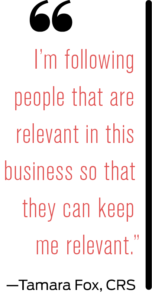Agents need to understand the differences between marketing on LinkedIn versus all other social media platforms
By Steve Hendershot
Every social media platform offers opportunities for real estate professionals.
While they all have the ability to connect with clients and colleagues, LinkedIn’s professional focus makes it unique. One reason is the audience: LinkedIn is an ideal spot to reach homebuyers as well as the people who advise them.
“The gatekeepers—lawyers, accountants, financial planners—they’re all on LinkedIn,” says Jack Cotton, CRS, an agent for Sotheby’s International Realty who specializes in luxury homes on Massachusetts’ Cape Cod peninsula. “When their clients have a need for a REALTOR®, [gatekeepers] will poke around to see who’s out there” that they could recommend.
Earning that sort of high-end referral is a dream scenario for many REALTORS®—yet it’s easier dreamed than done. Here are five tips to crafting an effective LinkedIn presence that can win the trust of gatekeepers, potential clients and colleagues alike.
Make yourself an expert
Cotton succeeds in winning over gatekeepers only because his LinkedIn positions him as a real-estate expert who is worthy of a high-end referral. From his LinkedIn blog posts focused on educating fellow agents, to his profile that highlights his “Selling Luxury Homes” book, Cotton aims to position himself as not just a REALTOR®, but an expert REALTOR®. That strategy not only leads to referrals from fellow agents, but also lends him credibility in the eyes of those gatekeepers.
“The overriding thing I’m doing on LinkedIn is conveying and displaying my expertise, because people on the high end only want to deal with experts,” Cotton says. “They see this guy who’s posting all this content and who other agents are learning from, and think, ‘Because he’s teaching other REALTORS®, he must really know what he’s talking about. I think I’ll recommend him.’”
Position yourself as a problem-solver
One caveat to the previous point: Expertise in a vacuum isn’t worth much. Your value will come from positioning yourself as an expert who is capable and interested in solving people’s problems.
“You always have to come across as a solution provider who is willing to help,” says Burton Kelso, a Kansas City-based consultant who provides tech advice to real estate professionals. Your aim should be to convey leadership as well as approachability, “making sure that people understand that they can come to you,” he says.
Don’t just push out content—participate, too
While demonstrating expertise is valuable, you’re missing the point if you only see LinkedIn as a place to flex. As with other social networks, there’s huge value in liking and commenting on others’ posts, and keeping up with the career changes and ideas of those within your network.
 “Yes, it’s a place to build your identity as a thought leader, but it’s also a place to get information. You don’t want to be unilaterally pushing information out—you should also absorb it,” says Jason O’Neil, CRS, president of Circle Real Estate in Carmel, Indiana.
“Yes, it’s a place to build your identity as a thought leader, but it’s also a place to get information. You don’t want to be unilaterally pushing information out—you should also absorb it,” says Jason O’Neil, CRS, president of Circle Real Estate in Carmel, Indiana.
That includes paying attention to content from industry experts such as Lawrence Yun, an economist for the National Association of REALTORS®. Market news and insights can not only prove informative, but also can make for great re-posts that enhance your own credibility.
“I’m following people that are relevant in this business so that they can keep me relevant,” says Tamara Fox, CRS, an associate broker with RE/MAX Unlimited in Huntsville, Alabama.
A sneaky source for market intel
Clients don’t necessarily post on LinkedIn to announce their plans to move. But announcing a new, out-of-town job can amount to the same.
“It’s where professionals are going when they’re changing jobs, and when they’re looking at new areas for potential job moves,” Fox says.
That sort of insight can be invaluable for REALTORS®. For example, Tim Kinzler, CRS, a REALTOR® at Keller Williams Realty in Boca Raton, Florida, used LinkedIn to research a potential referral, and not only learned about the client’s background and likely price range, but also discovered that the client’s entire company was relocating to Florida, opening up the possibility of additional referrals.
“It allowed me to have a better understanding of who I was dealing with,” says Kinzler.
The value of that sort of client insight also may make it worthwhile to consider LinkedIn Premium, which enables users to see who views their profiles. O’Neil says that feature helps him anticipate and prepare for potential referrals.
“I’ve found that most professionals view your profile before interviewing you,” O’Neil says.
Find a rhythm (and team) that fits
Agents are busy. So where are you supposed to find the time to create expertise-burnishing LinkedIn content while also engaging with others’ posts?
Some agents choose to partner with marketing specialists to help them stay on top of it. Cotton, for example, creates his own content but relies on others to post it. Fox sometimes uses posts created by an external marketing firm, but curates and edits them to ensure they’re right for her network. Kinzler also uses an external firm but takes time each morning to respond to LinkedIn posts from his network, especially if the initial post was generated by the marketing team.
“That way they know that it’s not a robot,” Kinzler says.
LinkedIn is different from other social-media networks like Facebook, Instagram and TikTok. It’s more professional and buttoned up, and less prone to memes and name-calling—just one reason that Fox describes LinkedIn as “a breath of fresh air compared to some of those other channels that are just, frankly, exhausting.”
LinkedIn also offers lots of potential value to real estate professionals who tailor their marketing strategies to fit the channel’s unique personality.
The First Step to LinkedIn Success? Dial in Your Profile
Before you start posting blogs or engaging potential leads on LinkedIn, a crucial first step is to ensure your profile is ready for prime time. Here are a few questions to ask yourself before hitting “update.”
1. Are you searchable? Are you reachable? Some agents like to get creative with their job titles, calling themselves matchmakers or home-finders, for example. But when people turn to LinkedIn for help buying or selling a house, they’re likely to search for “REALTOR®” or “real estate agent.” It’s important for your profile to contain those key terms as well as your contact information, says Tamara Fox, CRS, an associate broker with RE/MAX Unlimited in Huntsville, Alabama.
2. Is everything spelled right? Fleshing out your LinkedIn profile can feel tedious, but it’s important to be thorough and to re-read everything (or, better yet, have someone else read it) before posting. That’s because when you’re trying to put your best foot forward, typos are a killer.
“Especially with this network being a little bit more professionally minded, there’s nothing worse than having misspelled words or poor grammar,” says tech expert Burton Kelso.
3. Is your profile complete and up-to-date? A strong LinkedIn presence requires ongoing effort—not just creating new content but ensuring that your profile remains up to date and includes items that could spark a connection such as education and volunteer experience.
“Your profile has to be accurate and complete. I can’t tell you how many times I see real estate agents whose bio doesn’t match up with their profile,” says Jason O’Neil, CRS, president of Circle Real Estate in Carmel, Indiana.
Check out the webinar Build Your Real Estate Business to the Next Level with LinkedIn, presented by Burton Kelso at CRS.com/webinars.
Photo: iStock.com/mattjeacock








